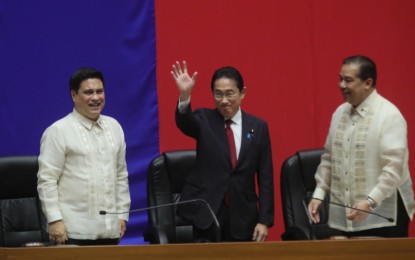
SPECIAL ADDRESS. Japanese Prime Minister Fumio Kishida (center) greets the Joint Session of Congress at the House of Representatives in Quezon City on Saturday (Nov. 4, 2023), accompanied by Senate President Juan Miguel Zubiri (left) and Speaker Ferdinand Martin Romualdez. In his speech, Kishida said he is determined to defend a free and open Indo-Pacific and emphasized the importance of cooperation among allies and like-minded countries in maintaining and strengthening a free and open international order based on the rule of law. (PNA photo by Avito C. Dalan)
MANILA – Japanese Prime Minister Fumio Kishida on Saturday reaffirmed Japan’s commitment to a “free and open Indo-Pacific” (FOIP) and vowed to work with the Philippines and the Association of Southeast Asian Nations (ASEAN) to achieve this goal.
In his address before the Special Joint Session of Congress at the House of Representatives in Quezon City, Kishida noted how the international community is currently at a historic turning point, and the international order based on the rule of law that leaders have taken for granted is under serious threat.
“The international community is also facing complex and interrelated challenges such as climate change and infectious diseases. Under these circumstances, we cannot afford to have the world be divided based on ideologies and values,” he told Congress and members of the diplomatic corps.
The Japanese leader said that after listening to diverse voices of the international community during the G7 Summit that he hosted in May this year, he strongly felt that there was the need to return to the very basic foundation that everyone can share -- the idea of human dignity.
“In order for everyone to live with dignity, it is essential to build a peaceful and stable world. From this standpoint, I confirmed with President (Ferdinand R.) Marcos (Jr.) during his visit to Japan in February that we would work together to maintain and strengthen the free and open international order based on the rule of law,” Kishida said.
Kishida said he is “strongly” determined to defend FOIP, lead the international community toward cooperation rather than division and confrontation, and defend freedom and the rule of law at all costs.
The new FOIP plan has four pillars: uphold principles for peace and rules for prosperity; addressing challenges in an Indo-Pacific way; strengthen multi-layered connectivity; and extending efforts for security and safe use of the sea to the air.
Kishida said the first pillar is the idea of building peace by confirming and promoting the basic principles that the international community should uphold. citing as example the link between the stability in the Mindanao region to peace and prosperity in the Indo-Pacific.
He said Japan's contributions and cooperation in advancing stability in Mindanao is based on the vision of the FOIP.
Kishida said the second pillar is a result of Japan’s continuous dialogue with the ASEAN -- the idea of addressing global challenges in a realistic and practical manner, and enhancing resilience and sustainability of each country as an equal partner.
Fifty years since Japan initiated dialogue with ASEAN ahead of the rest of the world, he said Japan and the 10 member nations have helped each other in times of difficulty and nurtured a relationship of trust with a heart-to-heart connection through exchanges amongst peoples in a wide range of fields and at various levels.
“It is evident that the world as a whole must respond to international health challenges. Japan will support the ASEAN Centre for Emerging Diseases and Public Health Emergencies to develop as a regional center of excellence,” he said.
Kishida said Japan will also promote the third pillar of the new FOIP plan, with ASEAN as one of the priority regions in overcoming vulnerabilities by strengthening the linkages among countries.
He said Japan will promote cooperation in line with the ASEAN Outlook on the Indo-Pacific (AOIP), which resonates with the FOIP.
“We will work with ASEAN to ensure that many countries support and cooperate for the principles and activities set forth in the AOIP, such as openness, transparency, inclusiveness, and a rules-based framework,” Kishida said.
He cited Japan’s USD100-million new contribution to the Japan-ASEAN Integration Fund in March and the launching of the Japan-ASEAN Comprehensive Connectivity Initiative in September both strengthen connectivity in tangible and intangible fronts.
In promoting the last pillar of the FOIP, Kishida cited Japan’s contributions to Philippine defense and security.
These include the 12 ships provided by Japan to the Philippine Coast Guard to enhance Philippines’ maritime security capability, the delivery of a warning and control radar by a Japanese firm to the Philippine Air Force in October to improve Air Domain Awareness, and Friday’s agreement for the provision of coastal surveillance radars to the Philippine Navy as the first cooperation project in the world under Japan’s newly established Official Security Assistance, among others.
Strengthening Japan-Philippines-US Cooperation
Kishida also emphasized the importance of cooperation among allies and like-minded countries in “maintaining and strengthening a free and open international order based on the rule of law.”
“In September, President Marcos, United States Vice President (Kamala) Harris, and I exchanged views for the first time and confirmed to enhance cooperation,” he pointed out.
He said the trilateral cooperation to protect the freedom of the sea in the South China Sea is underway, which included the participation of Japan's Self-Defense Forces in the joint US-Philippines exercises held last month, and the first joint exercise by the coast guard agencies of the three countries held in June.
“Through these efforts, let us protect the maritime order, which is governed by laws and rules, not by force,” Kishida said.
In conclusion, Kishida pointed out the significance of the “Golden Friendship, Golden Opportunities” slogan for the 50th Anniversary of ASEAN-Japan Friendship and Cooperation.
“At the ASEAN-Japan Commemorative Summit Meeting in December, I hope to work with President Marcos and other ASEAN leaders to ensure that the golden friendship between Japan and ASEAN will be a golden opportunity that leads to the next generation,” he said. (PNA)
